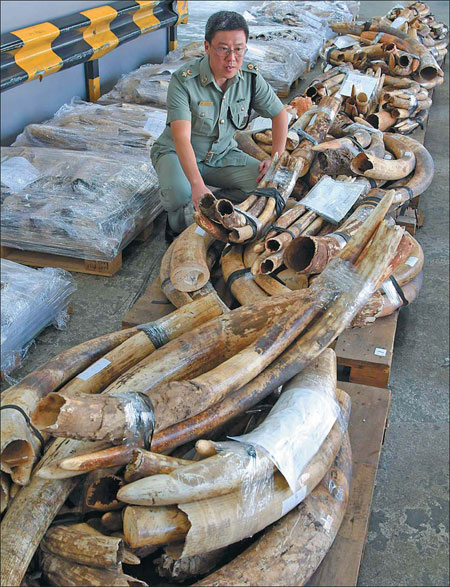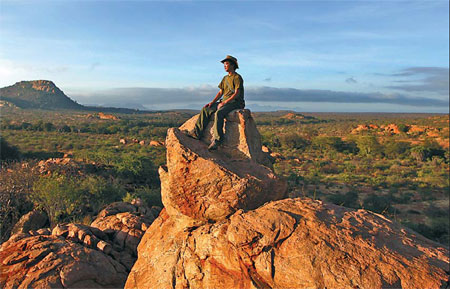No horns of a dilemma over conservation
Updated: 2012-10-26 12:45
By Li Lianxing (China Daily)
|
|||||||||||
|
More than 1,200 elephant tusks are put on display in Hong Kong last week. The largest seizure of smuggled ivory in Hong Kong was made during a joint operation with authorities in Guangdong province. Reuters |
|
Zhuo Qiang surveys the wild in Kenya. He established the Mara Conservation Fund and his own patrol team in 2011, with the intention of protecting lions and other wildlife in Kenya's Masai Mara nature reserve. Provided to China Daily |
Consumers increasingly realize wildlife needs to be protected
Paul Muya, a deputy spokesman for the Kenya Wildlife Service, is concerned every time he sees reports about the booming wealth of China's middle class. He wonders if the growing affluence will whet appetites for wildlife products and fuel the poaching of elephants and rhino in his homeland. However, it's not a one-way traffic: A growing number of Chinese are participating in a variety of campaigns focused on wildlife protection.
Li Yuchun, one of China's most famous pop singers, visited a number of Kenyan nature conservancies in early October during a trip to promote awareness of elephant and rhino protection.
Meanwhile, Yao Ming, the former NBA basketball star, visited several conservation areas in Kenya and South Africa in September.
Yao pledged that he would tell the Chinese people that the poaching and trading of elephant tusks and rhino horns is unacceptable. "We (Chinese people) would definitely be infuriated if someone killed our pandas, so we are also very sad about the rhino and elephant poaching here in Africa," he says.
In addition to the celebrities, an increasing number of Chinese are alarmed by the deteriorating security situation for African wildlife and interested in contributing to campaigns.
The Chinese lion
Zhuo Qiang, who likes to be known as Simba, meaning lion in Swahili, established the Mara Conservation Fund and established his own patrol team in 2011 with the intention of protecting lions and other wildlife in Kenya's Masai Mara nature reserve. Zhuo's campaign has drawn financial support from a number of wealthy Chinese backers.
Zhuo once dreamed of living with the lions on the African savannah, but the dream has changed over the years, and now all he wants to do is protect these big cats.
"It took six years to take this step. I flipped over Africa and the wildlife, especially the lions, on a trip in 2004. It was love at first sight," he says. "It was extremely difficult for me, an ordinary person, to make the decision and come to live in Africa."
Born in 1973, Zhuo was 31 when he fell in love with African wildlife. He had a good job in government, a happy family and more stability than many of his peers.
"Giving up all those things appeared insane to my parents and my wife. It was difficult for them to understand how important it is and how much it means to me to help protect the wildlife," he says. "But I even asked myself many times if I really should do this."
He says Chinese efforts on animal protection tend to focus heavily on domestic concerns, such as the trade in bears' gall bladders, tiger bones and pandas, and even the mistreatment of cats and dogs. Many people found Zhuo's desire to leave home and travel to Africa incomprehensible, because there are plenty of wildlife problems to be addressed in China.
Zhuo has now settled in a conservation area in the Masai Mara. He relies on his savings and occasional donations to run his protection team, mainly staffed by locals. In addition to his unpaid, daily patrol work, he has another mission - to educate both the increasing numbers of Chinese tourists visiting Africa and the people back at home.
"We must let them know what is happening on the ground and how terrible the situation is," he says. "If we can increase awareness and tell people they shouldn't buy wildlife products, demand will decline."
He concentrates his efforts on school students for two reasons. First, because the school-age generation is the future of China; and second, they have influence over their parents' generation, which has the financial clout and the inclination to buy ivory carvings or rhino horns.
"Young Chinese people are much better educated nowadays and they understand the urgency of protecting wildlife, regardless of where they are," Zhuo says. "But they lack information and the means of gaining the relevant knowledge."
He uses online social networks to publicize his aspirations, daily work and his plans: "The project has attracted more than 1,000 college students from more than 300 universities across China to join the education program," he says. "Those who show the most dedication and have formulated specific plans for dealing with the problem are rewarded by being given the chance to visit us in the field to witness our efforts and join in."
Rising awareness
Ge Liwen, a recent graduate who majored in Korean and is now responsible for recruiting volunteers for Zhuo's team in China, says awareness of animal protection in countries such as Kenya or South Africa has increased dramatically at her college, but there's still a long way to go.
"People used to lack the means to understand the big picture about wildlife products. They probably thought that buying one or two items would have a minimal impact on the overall situation, but in fact those small pieces at home amount to slaughter on the savannah," says Ge.
"I know it's not just a passing whim but a lifetime commitment, because everything we do here is connected to the fate of animals in Africa," she says. "If no one stands up and backs us, the animals will live in desperation."
Other volunteers, such as Liu Ming-yu, have greater professional experience. The young graduate has a plan for wildlife protection overseas, one that could possibly see him becoming the next "Simba".
"I studied biology in college and was involved with several animal protection programs in China until I learned of the deteriorating situation in Africa," he says. "Educating the public about wildlife concerns and gaining a further degree in protective biology will be my contribution in the near future."
As a volunteer who has seen the killing sites in African nature reserves, Liu says he has an obligation to let those who have bought ivory, rhino horns or other wildlife products know what a bloody trade they have engaged in.
"I must do something I love and meaningful in this, the prime of my life," he adds.
Zhuo says an increasing number of well-to-do Chinese have indicated great interest in his animal protection project and, after seeing his promotional material, have vowed not to buy wildlife products.
"This indicates progress," says Zhuo. "They don't have to come to Africa to display their dedication, some have joined the campaign by supporting me financially."
He says Chinese awareness of international wildlife protection is still in its infancy, but the future looks promising.
Independent Asian wildlife protection organizations such as Zhuo's are hard to find in Africa. However, Japan, once a major consumer of wildlife products, sends volunteers to the Kenya Wildlife Service, the state body charged with protecting wildlife, to work on public education programs.
"It's vital to learn about the situation on the ground and then return to Japan to tell the full story to the Japanese people," said Shinnosuke Tachio, a volunteer from the Japanese International Cooperation Agency.
Ivory prices soar
The soaring price of ivory is the biggest driver of the continued rise in elephant poaching, according to Paul Muya.
A 2011 report published by the Kenyan Wildlife Service and other organizations said the price of tusks from the largest elephants poached in the north of the country was equal to 18 months' salary for a wildlife ranger, or 15 years' salary for an unskilled worker. Currently the price is around 18,000 Kenyan shillings ($211) per kg.
The new wealth in China worries animal protection groups. "There is more disposable income in China today than at any time in history. Ivory has the cachet of being a luxury-status commodity and more people than ever are able to own a piece now," said Tom Milliken, global elephant and rhino program leader for a wildlife trade monitoring network called Traffic, which described 2011 as an "annus horribilis" for African elephants in a report.
The ivory trade boomed in the late 19th century, bringing Africa's first wave of wholesale elephant slaughter, although things improved when measures to regulate the trade were introduced in the early part of the last century.
However, rising prosperity in the Asian region, especially in Japan, in the 1970s and '80s saw the animals come under attack once again, according to the Kenyan Wildlife Service.
An estimated minimum population of 1.3 million in 1979 had fallen to half that number by the mid-1980s and to approximately 450,000 by 2007, according to testimony provided to the United States Congress by Iain Douglas-Hamilton, a founder member of Save the Elephants, who has been conducting research into African elephants for more than 45 years.
And the trade doesn't just encompass carvings and artworks - some people still believe that powered rhino horn is a medicine or tonic and has great nutritional value. In fact, the horn is mainly composed of bone covered by a layer of keratin, a substance also found in human hair and nails. In 1993, the Chinese government banned the use of rhino horn as a medicine.
Kenya isn't the only country experiencing problems with poachers, of course. Since the beginning of this year, 388 rhino have been killed by poachers in South Africa's Kruger National Park and provinces such as Limpopo, KwaZulu-Natal and North West, according to the country's government statistics.
The country is home to approximately 22,000 white and 4,800 black rhino, which are native to Africa and represent 93 percent of the world's total population.
"The illegal wildlife trade in the 21st century has an estimated value of $7.8 billion to $10 billion per annum, a figure which, if correct, would make it the fifth-largest illicit transnational activity globally, after counterfeiting and the illegal trades in drugs, people and oil," according to Douglas-Hamilton.
The eradication of poaching in Africa depends on rooting out the market for the products, which in this case is mainly in Asia, because the high demand is still the key driver behind poaching.
"We must increase our awareness regarding the current situation and cut the market demand for elephant tusks and rhino horns, which means we must prevent anyone around us buying these products and explain how the environment and survival of these animals in being endangered," said Yao Ming after his visit to Africa.
"I believe that once Chinese consumers learn of the serious consequences of buying these products, they will change their minds," he said.
lilianxing@chinadaily.com.cn
(China Daily 10/26/2012 page24)
Today's Top News
Rescuers race against time for quake victims
Telecom workers restore links
Coal mine blast kills 18 in Jilin
Intl scholarship puts China on the map
More bird flu patients discharged
Gold loses sheen, but still a safe bet
US 'turns blind eye to human rights'
Telecom workers restore links
Hot Topics
Lunar probe , China growth forecasts, Emission rules get tougher, China seen through 'colored lens', International board,
Editor's Picks

|

|

|

|

|

|







